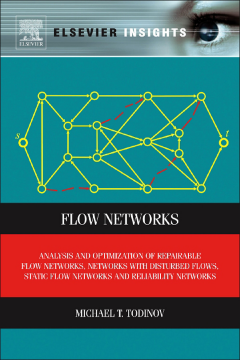
Additional Information
Book Details
Abstract
Repairable flow networks are a new area of research, which analyzes the repair and flow disruption caused by failures of components in static flow networks. This book addresses a gap in current network research by developing the theory, algorithms and applications related to repairable flow networks and networks with disturbed flows. The theoretical results presented in the book lay the foundations of a new generation of ultra-fast algorithms for optimizing the flow in networks after failures or congestion, and the high computational speed creates the powerful possibility of optimal control of very large and complex networks in real time. Furthermore, the possibility for re-optimizing the network flows in real time increases significantly the yield from real production networks and reduces to a minimum the flow disruption caused by failures. The potential application of repairable flow networks reaches across many large and complex systems, including active power networks, telecommunication networks, oil and gas production networks, transportation networks, water supply networks, emergency evacuation networks, and supply networks.
The book reveals a fundamental flaw in classical algorithms for maximising the throughput flow in networks, published since the creation of the theory of flow networks in 1956. Despite the years of intensive research, the classical algorithms for maximising the throughput flow leave highly undesirable directed loops of flow in the optimised networks. These flow loops are associated with wastage of energy and resources and increased levels of congestion in the optimised networks.
- Includes theory and practical examples to build a deep understanding of the issues
- Written by the leading scholar and researcher in this emerging field
- Features powerful software tools for analysis, optimization and control of repairable flow networks
"...a solid publication targeted at graduate students and academia, as well as industry researchers...useful mainly due to the presentation of models and algorithms applicable to real network problems." --IEEE Communications Magazine, December 2014
